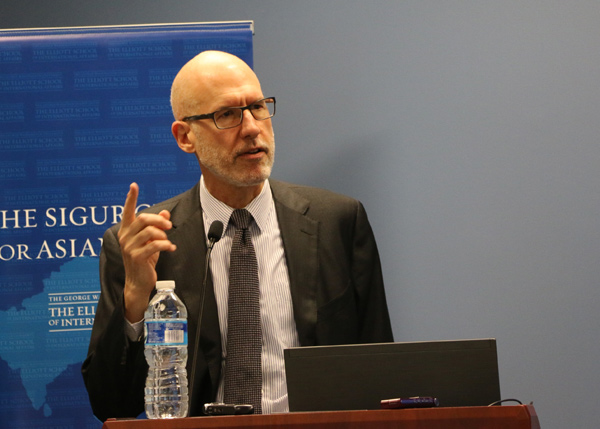China's local government debt in spotlight
Updated: 2014-11-28 06:09
By CHEN WEIHUA in Washington(China Daily USA)
|
||||||||
 |
|
Donald Clarke, a professor at the George Washington Univerity Law School, talks about China's local government debt and its legal challenges at a talk on Tuesday at the George Washington University. Chen Weihua/China Daily |
While the huge amount of local government debt in China has been making headlines for several years, some have questioned the legal guarantee for those debts to be paid off.
Donald Clarke, a professor at George Washington University Law School, said bond buyers have to know that local government guarantees in those years are legally worthless because the governing bodies are not allowed to do that under Chinese law.
Clarke pointed out that in some cases prospectuses have explicitly said that local government will not offer any guarantee for the repayment, but those are often overlooked by lenders.
"So bond buyers are told in the prospectus that if bond buyers are not paid off, they will not be paid," Clarke said at a talk at George Washington University on Tuesday.
The borrowers who Clarke described are known as local government financing vehicles (LGFVs). Since local governments are prohibited from borrowing, they rely a lot on off-budget mechanisms to finance priority projects. As a result, they usually set up wholly owned corporations to raise money for infrastructure and other local projects.
These LGFVs, of which there are more than 10,000 in China, are responsible for some 40 percent of the local government debt and contingent liabilities.
According to the National Audit Office, total local government debt and contingent liabilities in China shot up to 17.89 trillion yuan (about $3 trillion) as of June 30, 2013, up about 70 percent from the 10.7 trillion yuan (about $1.8 trillion) at the end of 2010.
In Beijing on Wednesday, Bai Chongeng, vice-dean of the School of Economics and Management at Tsinghua University, told a conference that some local governments have offered certain guarantees, or the market believes the governments have offered guarantee for the borrowing.
"So it's unclear whether it's the responsibility of the local governments or LGFVs to pay them back," he told a conference organized by Caijing magazine.
He emphasized the importance to first sort out the responsibility for the large amount of debts.
At the conference, Yin Zhongqin, vice-chairman of the Financial and Economic Committee of the National People's Congress, the legislature, stressed the high risk of local government debts because they were raised through local government platforms that bypassed relevant laws and were often raised through local banks or by mortgaging the land.
Yin said that if strict financial rules were applied, some local governments already would have lost their ability to borrow more to repay the debt. "According to the market rules, some local governments have already gone bankrupt," he said.
Strengthening the management of local government debt has been high on the agenda of China's central government. On Oct 2, the State Council, China's cabinet, announced specific rules to manage and control the risk of local government debt.
The announcement came a month after the National People's Congress passed amendments to the country's Budget Law on Aug 31.
While the old Budget Law barred local governments from issuing bonds, the new Budget Law allows the 32 provincial-level regions on the Chinese mainland to borrow under a quota set by the State Council. The amendments said local governments should no longer borrow through LGFVs.
While the ability of the local governments and the LGFVs to repay the debts are often in the spotlight, Nicholas Lardy, a senior fellow at the Peterson Institute for International Economics, said early this year that the bulk of the local government debt has been used to finance infrastructure and other municipal projects that have high economic returns. But he admitted that financial returns on these projects will be low.
Lardy described these debts as mostly domestic, and said China is not an outlier in these debts in terms of their ratio to GDP, compared with other countries such as India.
He said the government should subsidize projects such as subway systems, which are a public good and benefit everybody. "The fact that the subway system does not have the means to repay does not mean it's a mistake," he said.
A large chunk of the local government debt was raised after the central government launched a 4 trillion yuan stimulus plan in 2009 to finance infrastructure and municipal projects, among many other areas.
chenweihua@chinadailyusa.com

 Across Canada Nov 30
Across Canada Nov 30
 Man begs for punches in exchange for donation for ailing son
Man begs for punches in exchange for donation for ailing son
 Trending: Soldiers dance the Little Apple song
Trending: Soldiers dance the Little Apple song
 Letting kids bridge cultures
Letting kids bridge cultures
 Across America over the week (Nov 21- Nov 27)
Across America over the week (Nov 21- Nov 27)
 Daredevil dancer conquers mountain
Daredevil dancer conquers mountain
 Chinese float gives joy at Macy's parade
Chinese float gives joy at Macy's parade
 Calm comes to troubled Ferguson
Calm comes to troubled Ferguson
Most Viewed
Editor's Picks

|

|

|

|

|

|
Today's Top News
China's Xi seeks new outlook on foreign affairs
Ferguson police officer who killed black teen resigns
China to expand input to fight HIV: Premier
Premier: Govt to beef up anti-AIDS efforts
Curbs on religious extremism beefed up in Xinjiang
Mandarin's moment
China, US fight terror on the Internet
How to give is focus of philanthropy forum
US Weekly

|

|







